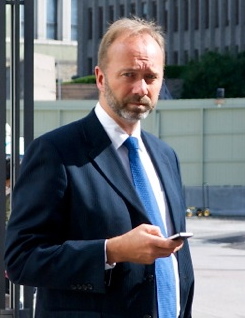UPDATED: Claims of corruption, camaraderie and conflicts of interest have been pouring down on some of Norway’s top government ministers, with Justice Minister Grete Faremo a prime target. Trade Minister Trond Giske is also catching flak, with some raising questions about the ministers’ ability to do their jobs.
Faremo, Giske and even new Health Minister Jonas Gahr Støre, who as Foreign Minister was arguably the government’s most well-regarded, are caught in a deluge of criticism not just from the media and opposition politicians but from some of their own Labour Party colleagues as well:

*** Justice Minister Grete Faremo is accused of “ice cold” and “panicky” leadership and, most recently, of forcing former state police director Øystein Mæland out of his job. Mæland himself told newspaper VG over the weekend that Faremo, an old friend, turned against him and used their friendship to declare herself inhabil (caught in a conflict of interest) and “get rid of me as quickly as possible and without speaking with me directly.” Faremo, it’s alleged, let Mæland take the fall for crushing criticism of the police in the July 22 Commission’s report on the emergency response to last year’s terrorist attacks. He’s furious and so are many other employees in the Justice Ministry, where a recent survey revealed that nearly half of them want to quit. Faremo steadfastly refused to comment on the Mæland case, calling it a “personnel matter,” but told Norwegian Broadcasting (NRK) on Monday that she was sorry about the situation and now wishes she had contacted Mæland before she declared herself as being in a conflict of interest, and before he quit.

***Trade Minister Trond Giske is also under heavy criticism, not least from fellow Labour Party officials, for failing to tackle the issue of high salaries for executives of state-owned companies. Labour has for years decried high executive pay, also at private companies, and blasted boards of directors that grant their top executives big raises when demanding moderation among other employees. Giske made a point last summer of criticizing the high executive pay himself, even calling in directors of some state-owned companies, but his credibility is severely tarnished after news broke that executives of state-owned real estate firm Entra Eiendom are the highest paid in the Norwegian real estate business. Even more controversial: An old friend of Giske was named chief executive of Entra at a salary much higher than counterparts in private industry, and the appointment came over the objections of the chairman of Entra’s board and two other professional board members. Giske responded by not responding, declaring himself inhabil (caught in a conflict of interest) and refusing to comment on the issue. Moves were under way to reverse the appointment of his friend, Rune Olsø, who has stressed he accepted the job at a salary (of around NOK 4 million) that was one million kroner less than his predecessor received.

***Health Minister Jonas Gahr Støre appears to be “stumbling at the start” of his leadership of Norway’s highly criticized public health services, according to some media commentators. Instead of addressing the problems of a controversial hospital reorganization and doctors’ repeated charges that patients’ lives are at stake, Støre has denied that either the state health care system or its hospitals are in crisis. He spent much of his first week on the job last week praising the system and stressing that Norwegian health care is among the best in the world. “My job is to tackle problems,” he told newspaper Dagsavisen, “but it would be unfair to the 100,000 people who work in the hospital sector if I paint a picture that everything is in crisis, because it’s not.” While many have called for the firing of the state bureaucrat responsible for the country’s largest health care region Helse Sør-Øst, Bente Mikkelsen, Støre seems to be protecting her so far. Expectations were high that Støre would take decisive steps to quell criticism and “save” the hospitals but there’s been little sign of that and even some of his own party colleagues are wondering why. On Monday, newspaper Dagens Næringsliv (DN) reported that the board leaders of several Norwegian hospitals would be replaced, but there was disagreement over whether that was at Støre’s initiative.
Opposition politicians, keen to unseat the Labour Party-led government coalition in next year’s elections, were on the offensive while Faremo, Giske and Støre were left on the defensive. “This smells of corruption,” Siv Jensen, leader of the conservative Progress Party, told Norwegian Broadcasting (NRK), referring specifically to the Giske/Entra Eiendom issue. “The government has held power for too long (since 2005) and now treats the whole country like its playpen.”
Others agreed, with former Finance Minister Per-Kristian Foss of the Conservative Party saying that the appointment of Giske’s friend while Giske is boss of the business and trade ministry “can seem like camaraderie,” something Prime Minister Jens Stoltenberg denied. Stoltenberg was, however, appointing another minister to take over the case and condoned other Labour Party officials’ complaints that Giske had allowed “much too high pay” within Entra. Stoltenberg, who hand-picked Støre to take over the health ministry, supports Støre’s initial efforts to boost the image of the health care sector and calm concerns in the hospitals. There was no comment on the charges against Faremo by Mæland, who also was a close friend of Stoltenberg and even played a role in Stoltenberg’s wedding years ago.
Views and News from Norway/Nina Berglund
Please support our news service. Readers in Norway can use our donor account. Our international readers can click on our “Donate” button:

